The Science Behind Brewing the Best Beer
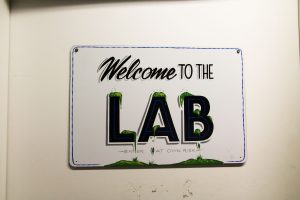 In my second instalment of my post on careers in distillation, I thought I’d talk about the booming craft brewing industry as a potential career choice.
In my second instalment of my post on careers in distillation, I thought I’d talk about the booming craft brewing industry as a potential career choice.
As the craft beer industry continues to grow, more and more scientific techniques are being utilized on the fermentation and brewing front.
For me, I never looked at the contents of my pint glass and considered all the research and scientific knowledge that went into creating the stout I was drinking. Being able to interview brewers and see first hand all the skills that go into creating craft beer has given me a new perspective and admiration towards the beer I drink.
I hope that sharing this research will transfer some of that admiration and interest on to you, inspire more people to support their local breweries, and branch out when it comes to trying new beers.
There are so many unique and innovative beers being produced here in B.C and each beer has a team of dedicated people behind the scenes creating and testing their products.
Once again, I would like to state that this research opportunity has allowed me to meet so many inspiring people throughout the process. I would just like to thank those of you who have helped me with this research and especially the brewers that took the time to be interviewed. I have learned so much and truly enjoyed every aspect of this experience.
Michael Kuzyk, Category 12
 Michael’s motto for his brewery Category 12 is “Beer Worth Leaving Your Career For.”
Michael’s motto for his brewery Category 12 is “Beer Worth Leaving Your Career For.”
All of their beer is based on a foundation of biology and chemistry. Michael earned his PhD in microbiology and biochemistry and his love for science turned into a passion for science-driven beer.
He uses a small 50L test brew for all new experiments. This allows him to tinker and tune all his recipes before they make a 1,500L batch. At Category 12 they value quality and local product, so all their brewing ingredients and equipment are Canadian made.
Because Category 12 is science driven, they are constantly experimenting with wild yeast strains, barrel aging, and the scientific process of brewing phenomenal beer. This love of science and attention to detail results in consistently amazing beer that you can count on every time.
In your experience what role does science play in brewing?
Oh, a lot. My background is very molecular biology which covered microbiology and biochemistry. In the brewhouse it’s all biochemistry. You’re trying to get the enzymes at their optimum activity levels and that requires temperatures and a lot of knowledge of what’s going on with the starch granules in the barley, to hop additions, and isomerization of alpha acid script bitterness. There are also essential oils for aromas. Then, when you get over into the cellar for fermentation it’s all microbiology so, it’s just husbandry.
What I love the most is playing with different yeast strains. Here we are interested in wild yeast strains or Belgium derived yeast strains that tend to add really cool aromas for everything from bubblegum to banana to clove to fruit. A lot of breweries will select one or two strains, but we’ve got over 20 in our library. We propagate our own yeast strains, so we’ve freed ourselves up from commercial yeast suppliers. For us, science is kind of the foundation everything we do.
How did you transition from standard and traditional sciences to what is more of an applied science?
I definitely would call myself an applied scientist from the start, and I think you see it my job history. I was already doing fairly industrially sponsored research like vaccine development which relates to agriculture, and I went to biotech right out of the gates. Then I got into scientific instrumentation working for a hardware vendor and then I flipped back into academia. I couldn’t really make up my mind if I wanted to be academic or did I want to be totally private industry.
Ultimately, I ended at the UVic proteomics centre and then a scientific software company. So, I’ve always kind of had a tactical slant to what I do. The common theme through all this was home brewing. I started in grad studies and then when I was at the software company I found I wasn’t really getting any lab outlet to my science. A lot of my work was on paper or in discussion, so brewing became my outlet on the weekends.
Did you find that there was a specific course that has helped you in this industry?
Oh yeah, I talk about MICR 200 a lot. It’s a foundational microbiology course. A good aseptic technique and being able to do a dilution plate or titration will go a long way. I still joke that I remember doing titration in first year in chemistry, all the time thinking, “What am I going to use this for?” and now we actually use it to determine the acidity level of our Sours.
Most breweries don’t do that, instead, they rely on P.H. which is totally the wrong way to try and measure acidity. So, we’re very exacting, we really care about our beers being the same batch to batch. We want to know how acidic it was exactly. There are several programs out there focused on brewing and it’s amazing how the lab side of it gets downplayed. I think you need to have good sanitation and a bit of an understanding of microbes. You know it’s the yeast that makes the beer. It’s not us. We just set the right stage.
Has your science degree allowed you to be more experimental and push the boundaries in brewing?
Oh, I do think so, I know there’s a lot of wild yeast strains that we work with called Brettanomyces. A lot of traditional breweries have been very scared to touch those yeast strains, but when you understand how to autoclave and what it takes to sanitize something, it becomes a lot easier.
We have to be really deliberate, careful and isolate everything to prevent cross-contamination. We’ve got the right tests in place to catch any potential missteps and with that scientific method helps a lot. It’s about isolating your variables and figuring out what the problem is. But because those tests are in place it prevents you from ever getting to the stage where you’ve made a catastrophic mistake, where you’re like OK this is going in the garbage. Fail fast at a small level.
What inspired you to work in this industry?
I remember a distinct Sunday where I had been in the garage all day and I think I was mopping up and realized I was enjoying every facet of it. Obviously doing something as a hobby versus having to do it as your job is a little bit different.
But also, I was traveling up and down the West Coast ten or so years ago and San Diego already had an exploding microbrew scene. I got to see a few nano-brews. A lot of people that didn’t have brewing backgrounds were making amazing beer and seem to be doing very well. It really kind of opened my eyes, and I thought, wow, it’s possible to make a transition.
What advice would you give students interested in pursuing a job within the industry?
Honestly, I’d say dabble in home brewing. It’s such a good introduction to brewing. What I’m looking for is people with passion, enthusiasm and one of the best hallmarks of that is that you’re pouring your own spare time into it.
There’s so much available online that at the home brew level you can make beer as good as commercial breweries. Something that you are proud of is a great addition to a resume. It’s almost like a portfolio in a way. I don’t think it’s hard to sort of differentiate yourself from the plethora of people who just say, “Oh, I like beer, can I work in a brewery?”
Euan Thomson, Phillips Brewing Co.
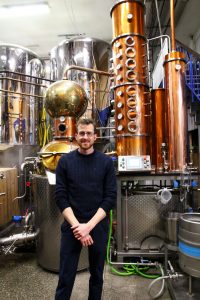 Euan graduated with a microbiology degree from the University of Alberta and immediately went to an Edmonton based brewery called Alley Kat to see if he could put his scientific skill set to use in the craft brewing industry.
Euan graduated with a microbiology degree from the University of Alberta and immediately went to an Edmonton based brewery called Alley Kat to see if he could put his scientific skill set to use in the craft brewing industry.
He is currently working at Phillips Brewing Co. as their quality assurance and research manager and is the co-founder of Smoke & Mirrors Coffee Co.
Euan has dived head-first into his research at Phillips and his research partnership with Professor Fraser Hof here at UVic. Together they are analyzing the methylation markers and aging process of the yeast used in brewing.
He is also a part of the accelerated whiskey aging experiments taking place at Phillips and trying to isolate and replicate the yeast found in a 100-year-old bottle of beer found in the floorboards of a house here in Victoria.
In your experience what role does science play in brewing and distilling?
Brewing and distilling are both founded on a lot of the science that happened back in the 1800s. I almost think the earliest scientists that we consider scientists in modern terms were only doing it so they could brew and distill better.
Every now and then I’ll end up looking at a paper from the early 1900s that still has relevance today. So, as we progress in our industry we’re looking to control flavour with all these different strains of yeast; and to keep getting better and better you need to understand the basic fundamentals of chemistry, as well as the fundamental biology.
What degree did you graduate from the University of Alberta with?
I did a PhD in microbiology after specializing a little bit in microbiology. I was working with more medical related microbiology at the University of Alberta. Towards the end of my studies I was getting more and more interested in brewing.
I could see this craft brewing movement bubbling up, so I showed up at Alley Kat Brewing in Edmonton and asked if I could help with anything. They were only just starting on their quality programs and were happy to see me come through the doors and start doing some bacterial plating. Simple stuff. But it went a long way for them and it showed me that I could use my microbiology skills and be of value in the industry.
How did you transition from traditional and medical sciences into brewing?
You know we have a fully functioning lab here at Philips and a lot of other breweries are starting to set up their own operations in that vein as well. It’s all about taking your skill set from science and applying it to brewing. You’re seeing more and more scientists coming into the field because it’s fun, and it’s a fun way to apply the skill set that you developed working in a lab.
Are there any other credentials or skill sets that you think would have been helpful when you entered this industry?
Maybe more of a focus on the industrial process and that sort of thing. I think when we’re doing basic research especially when you have that specialized focus you lose sight of the big picture of taking a product and bringing it to market.
The quality department operates as a node within the brewery. Almost like a gate, we are kind of the go or no go authority. We need to do a lot of checks to have that say in how things get released to the market. So, it took me a long time coming in from an academic background to wrap my head around the business operations and how the handling of raw materials and process steps can affect the product quality. Each department needs to have a bearing on what’s going on and what the final product is going to look like.
What inspired you to work in the brewing industry?
It was the intersection of my interests. I had a hard time specializing. Even doing a PhD I found that I still wanted to scatter all of my passions. I was working on five different things at once and you really can’t do that in academia.
I looked at the brewing industry and I can see that every day you show up and you can start off with chemical tests and then go out and do some tasting. It’s 9:30 in the morning and you’re drinking beer. But then you take that tasting information and work your way back to identifying some production flaws or what was done right or wrong. You are then integrating all that information together into a testable hypothesis.
What advice would you give students that are interested in pursuing a job in this industry?
Don’t neglect your chemistry. I would say I think there are lots of brewers out there that do neglect their chemistry. You can get so far with just brewing knowledge certainly. But as this industry matures there’s going to be a higher demand for people that can tie in the fundamental chemistry and microbiology to the brewing process.
How will your partnership and the research that you’re conducting with Dr. Hof change the brewing experience?
The outcome of that research is more likely to influence their direction as a lab in terms of what they’re capable of doing. If we find something in yeast in terms of the methylation markers for aging that is consistent with what they’ve found in prostate cancer cells, then that points to a universal mechanism for aging that is consistent between very different life forms. That’s the basic research part of it and that’s really exciting.
On the other side for us, we want to understand how long we can continue re-pitching yeast and what happens to that yeast at a genetic level. We want to find out how those methylation signatures change over the course of a year and how those yeasts replicate and age. But our job right now is to generate that data for people to start analyzing.
The Hof lab‘s capabilities are new to the world so nobody else can do this type of methylation tracking. Although we know that methylation is important, we can’t easily detect it without massive numbers of false positives and false negatives. So, they’ve really honed that technique and with this new technical capability we’ll find out new things about yeast and certainly about the prostate cells.
If your research is successful in predicting the lifespan of yeast, do you think the methyl marker detector machine will become commonplace within the brewing world?
That’s hard to predict. I think there’s always going to have a divergence in the industry between more scientifically inclined breweries and the ones that like the art of it. Or maybe breweries that propagate their own yeast consistently and don’t necessarily rely on pitching.
There is a lot of diversity in the industry in terms of what people are doing and what they are producing. So, I think it’ll be useful for some brewers if we can get this developed. But, more importantly, I think it’ll bring the brewing industry back into the science field in a way that hasn’t really happened in a hundred years. As more scientists start working in the industry we’re going to see more and more development on the science side of things.
Dr. Fraser Hof
Fraser has been a professor here at UVic for the last 13 years in the department of chemistry, and is also the Canadian research chair in Supramolecular and Medicinal Chemistry. His current research is based in organic chemistry, where his team works together in the lab to create new synthetic molecules that will bind with cancer-causing agents within a cell.
To continue this research, Fraser designed a new methyl marker detection machine that will help understand the aging process of cancer cells. Fraser and Euan Thomson have teamed up on this new research project to see if they can use the methylation and aging of yeast to further understand cancer cells and to advance the cancer research the Hof Lab is working on.
Where did you attend school?
At the University of Alberta, Edmonton, and then the Scripps Research Institute in La Jolla, California. I have a BSc in Chemistry and a PhD in Organic Chemistry.
Can you explain the research you are currently conducting and how that ties in with brewing yeast?
We study the methylation of proteins. It occurs naturally, and it’s the smallest possible change that can be made to a protein in a living system. Methylation acts as a switch to turn protein functions on and off. It has a special role in how cells respond to environmental changes.
How did you transition from studying cancer cells to studying yeast?
Our lab mostly has looked at how methylation of certain proteins fuels the growth of certain very aggressive types of cancer. In addition to making new drug candidates, we found at one point that we needed to invent a better way to study and catalog all of the methylation sites that are occurring in a given cancer cell samples.
It turns out that it’s really hard just to measure and observe all possible methylations that happen on all possible proteins. So, we made a chemical tool that binds and enriches them from cell samples, and it turns out that it allows us to prospect and catalog lots of previously unseen methyls, up to 10x as many as could be seen without our new method.
At some point, I was talking about this method with a friend — Dr. Euan Thompson, head scientist at Phillips Brewing and Malting. He asked if it would work for yeast as well because yeast also uses methylation to control and switch their proteins. Phillips is looking for better ways to manage their yeast health, and we think that measuring the methylation profile across hundreds of methylated proteins will give us a unique view. Long story short, it works, and it’s helping us to learn lots about how the yeast grow and change while they are powering successive fermentations at Phillips.
Has this research given you a new perspective on how science and brewing overlap?
Yes. I’ve learned a massive amount about the scientific approaches that are used throughout craft brewing. Our invention is just a small addition to the large amount of science that is already happening everywhere in the industry.
How will your research of yeast help you from a medical perspective, and further your research on cancer cells?
The two approaches have improved each other. Every time we figure out how to make the method work better for yeast, we can apply that lesson to cancer cells, and vice versa.
Hannah Charnock, Phillips Brewing Co.
Hannah is an incredibly accomplished and driven UVic graduate who has applied her chemistry background and hands-on learning to an industry she is passionate about.
She helped to start the co-op opportunity with Phillips Brewing Co. for science students and has worked closely with the UVic women in science program that aims to support female students pursuing jobs within STEM fields.
Hannah is currently working at Phillips Brewing Co. in their quality assurance and sensory evaluation lab to ensure that all the beer being released is the best it can be. She is also the co-founder of the small batch coffee roastery Smoke & Mirrors Coffee Co., and half of all their profits are donated to four organizations focusing on improving our community.
In your experience what role does science play in brewing?
It’s absolutely fundamental. A lot of the processes all the way through from the raw materials to the finished product are at their core biological or chemical process. Essentially every part of the quality program intersects with scientific methods. It allows us to do quality checks at all different kind of checkpoints. There’s actually a literature journal called The American Society of Brewing Chemists and it’s all compiled literature of research that’s happening all over the world in this field. So, it definitely has a legitimate scientific core to it.
What was your university degree in?
I just finished up a degree in chemistry at UVic. I did it with co-op which was really intentional because I knew that this was the industry that I wanted to be in. So, I found jobs in the liquor and coffee industries that I could apply my chemistry degree to.
So how did you transition from traditional science to an applied science field such as brewing?
Pretty seamlessly actually. There’s a lot of researchers, especially at UVic, whose work has application to brewing related science because yeast is a living thing and it’s a living process. There are a lot of people that you can contact to build an applied research project in the brewing field with; whether you’re working at the brewing facility or if you’re working on the academic side in the lab, ultimately, they are all transferable skills.
There any other credentials or skill sets that you think would have been most helpful in your transition?
I feel like the undervalued one is sensory skills; it’s something that is under credited because it seems like you just like to drink. But realistically, having some sort of formal tasting education is important in these fields because a lot of the work that you’re doing, ultimately, you are the quality control.
The microbial work and the chemical work is one thing but ultimately the consumer is what matters. So, knowing what an off-flavour tastes like or what a certain product in each phase of its production tastes like is so critical to succeeding in an industry.
It’s a big thing now to use wild fermentation and make sour beers, and it’s knowing the difference between an intentional flavour versus an off flavour when you’re working with that kind of stuff. Even if you can’t get that formal education until you’re in that workplace it is good to know what other local breweries are doing and what their products taste like.
What inspired you to work in the brewing industry?
I don’t know. Everything is kind of a gateway drug into it because I had family that were working in the wine industry and that is ultimately my career goal. I think that is what drove me to it.
It’s also just a really fun industry especially the scientific side of it because a lot of people in this industry are coming from a pretty rigorous academic background into a really fun exploratory side of science. Which is a really nice environment change that I like, so, I think that’s what keeps me there.
Is there any advice that you get to students interested in working in this industry?
Yes, when I wanted to work in this industry and do my co-op with Phillips I applied so many times, I think I kind of bullied them. I sent so many emails and was pretty relentless about saying that I have something valuable to offer.
I think a lot of times with a student going into a job it seems really scary and like they need to train you. But realistically even if it’s not exactly the skills you have, you offer something of value to them. You have the ability to work in a lab, do aseptic technique and these skills take a lot of the weight off of the quality team in regard to routine testing.
I think that it’s really important to know your worth and to do your research on what is going to be expected of you. Other than that, it’s just persistence and making sure that if it’s what you want to do that you just like go for it like you would with anything else.
How do you think the Phillips co-op position that you helped start will help students in the future?
It was actually funny cause I applied for it and they said sure we’ll take you on, and at that point, I had been pestering them for so long that I also contacted a winery. I got the job at the winery, so we had to push back the Phillips start date by four months. So, there was actually another girl, Nora, who did the first actual co-op term even though I bullied them into starting the program.
Since she and I have been there we’ve always had a lab tech on hand. It’s a good experience for the co-op student and it’s a good way for us to sort of lighten some of the routine workloads from some of the more senior staff. Then you get a whole lab that gets to take on a lot more research projects because people have the time to take them on.
That’s a big reason why a lot of these projects that have come up in the last few years have happened; it’s because we’ve leveraged free time for different people to jump onto these things. Every single person inside that lab has been super keen to learn about brewing and we get to jump in on all these projects, so it’s win-win. It’s amazing. So, this co-op position will be there for a long time.
Are there any particular skills that Phillips is looking for in students when they apply?
It’s a physically small lab space so we need to get someone who can work with people really well. Someone who is interested and who is able to take on projects independently as their skill set grows. More fundamentally we look for someone who has an understanding of aseptic technique which is helpful for doing some of the micro stuff. But beyond that a lot of this stuff is teachable and with these sorts of roles, they are entry level into the industry. You also want someone who really likes craft beer, who can have a conversation about craft beer. Everything beyond that is teachable.
How has the opportunity of hands-on learning and learning outside the classroom helped you in that industry?
Oh my gosh. That’s the whole thing. I wouldn’t have had the opportunity to apply for some of the grad school opportunities that I’m considering if I hadn’t had this hands-on experience. I think in a lot of ways what you can do in theory is a lot different than what you can actually do with your hands and your understanding of how to work in a brewing facility or a winemaking facility. I think the absolute number one thing is the hands-on work. You can have as much theory as you want but if you don’t know how to apply it in a way that is helpful to anybody it is not of much use.
Thank you
Being able to conduct these interviews and to learn more about the craft beer industry has taught me so much about the scientific techniques that are used during the brewing process.
Over the last month, I have learned so much about what to expect and what skills are valuable when it comes to working in a brewery. It has truly been an extraordinary experience to see the brewing process from start to finish and all the skills that go into making phenomenal beer.
Once again, I would like to thank the brewers that took the time out of their busy schedules to talk to and inspire me. Being able to talk to you and see your workplaces has shown me and made me consider all the work and passion that goes into the beer that we all love.

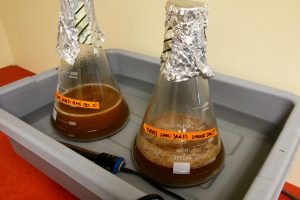
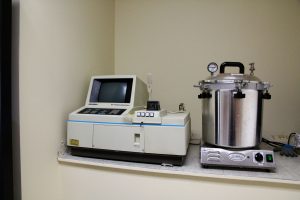

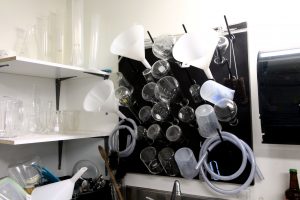

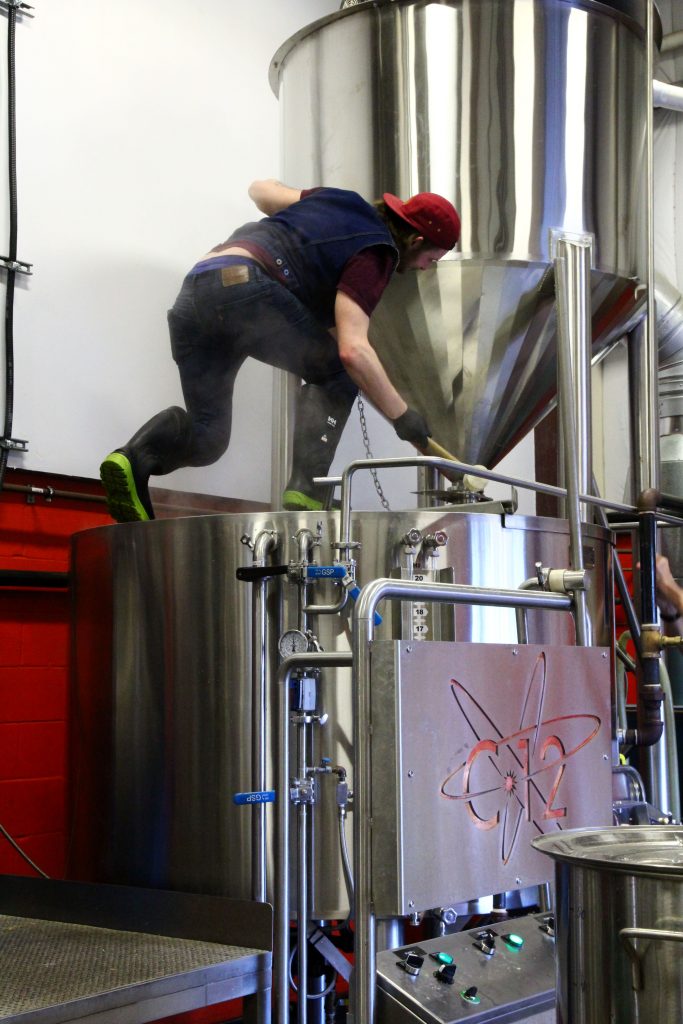

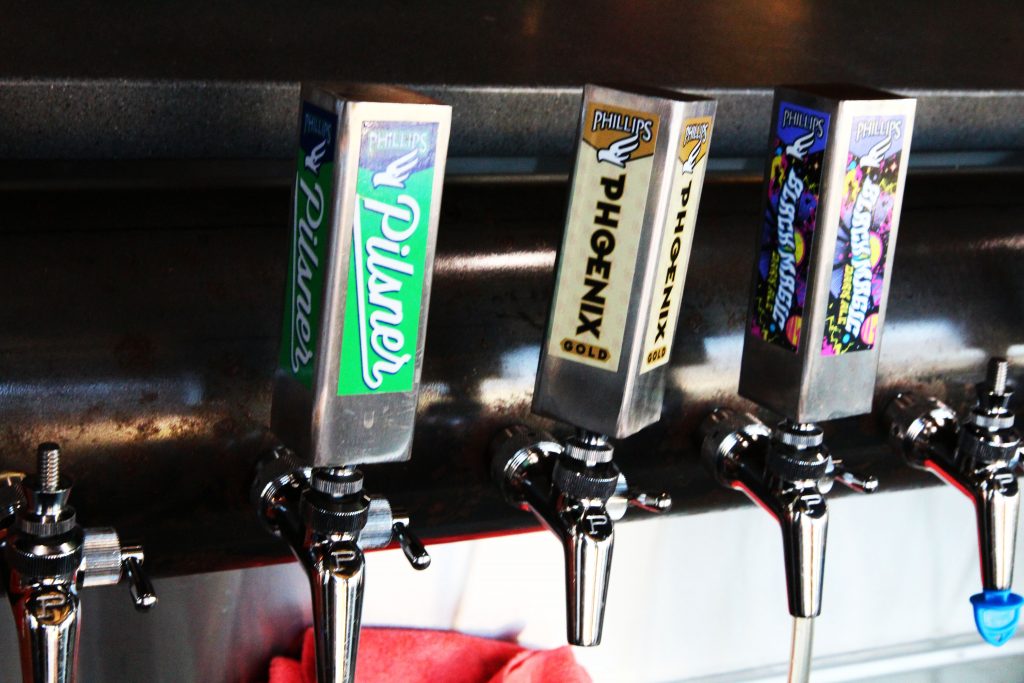
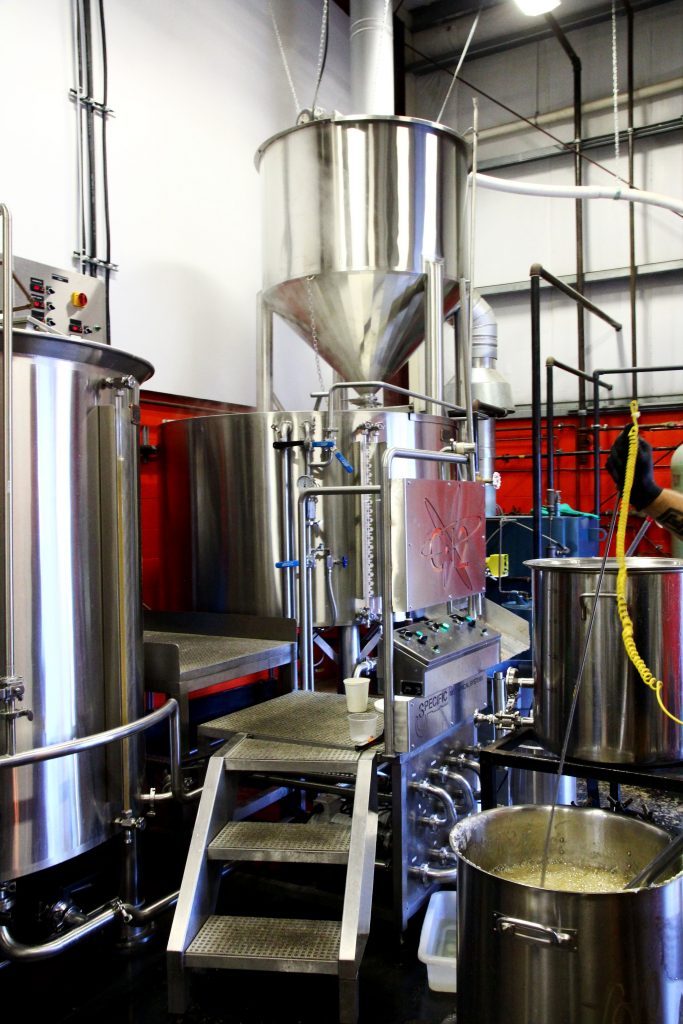


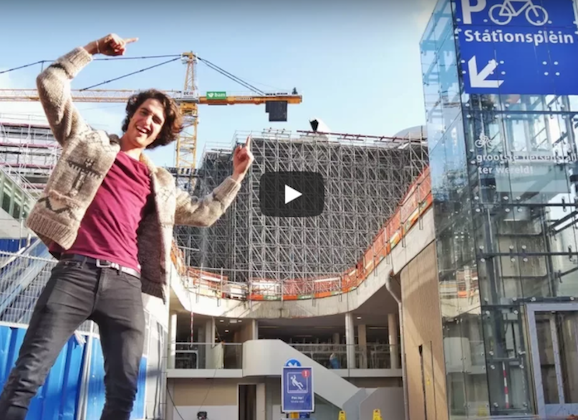
Wow!!! Fabulous post, Avery! A super interesting read!
Thank you! I am really glad you enjoyed it!
Excellent writing & reporting, Avery. We’re a couple of proud Grandparents!
I am glad I can make you proud!